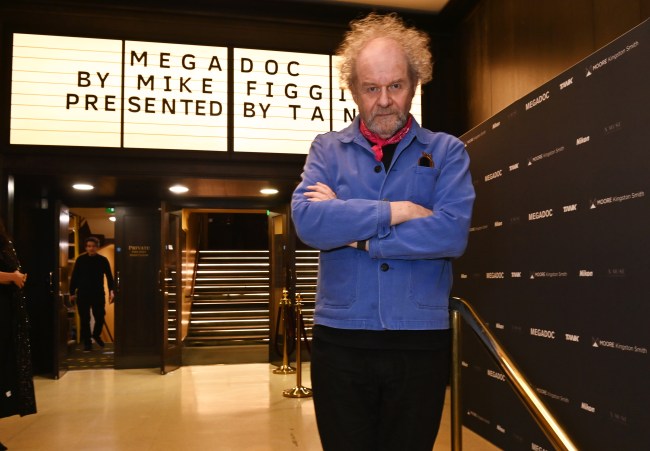Francis Ford Coppola‘s 2024 “Megalopolis” went off like a bomb — a succès d’estime, film maudit, or total disaster, depending on your perspective.
For his first feature in 13 years, and one decades in the making, the Oscar-winning “Apocalypse Now” and “The Godfather” filmmaker plunged more than $120 million of his own money into reimagining 21st-century New York City as a new Roman empire over which preside a visionary architect (Adam Driver) and a corrupt mayor (Giancarlo Esposito). Production began in earnest at Georgia’s Trilith Studios in November 2022, where Coppola bought out a Days Inn to convert into the production headquarters and the sprawling cast’s (which included Nathalie Emmanuel, Aubrey Plaza, Jon Voight, Shia LaBeouf, and more) living quarters for a four-month-long shoot.
Controversy followed, crews tussled, the trades reported mass exodus and creative disagreement on set. If you’re reading this, you know the rest of the story — all the way up to the film’s divisive Cannes 2024 premiere in competition, and the long road to Lionsgate eventually distributing “Megalopolis” in the fall to little noise and less box office ($14 million worldwide).
Filming all the while was Oscar-nominated “Leaving Las Vegas” and “Timecode” filmmaker Mike Figgis, who previously directed five documentaries of his own including one about a flamenco dance troupe. The result, with cameras rolling on set from production and onto quite literally the red carpet heading into the Palais des Festivals for the “Megalopolis” Cannes premiere, is the Venice-premiering documentary “Megadoc.”
Closer in spirit to the 1991 documentary about the making of “Apocalypse Now,” “Hearts of Darkness,” though certainly with less ruination and despair, “Megadoc” is hardly your typical behind-the-scenes feature-length featurette. A film IndieWire called “a riveting documentary about the making of a visionary disaster,” it’s an intimate look at Coppola’s mercurial artistic process and the shifting temperaments and on-set weathers experienced (and created) by everyone below and above the line — such as a canny episode that witnesses a frustrated LaBeouf unable to meet his grandmaster’s demands. “I don’t know what you want!” LaBeouf yells.
“The minute you turn on a camera, whether you’re filming a rehearsal, a documentary, a feature film or anything, the minute the camera turns on, reality clicks into another level, always,” Figgis told IndieWire. That’s to say there is a level of performance going on, whether Aubrey Plaza wooing or dismissing the camera or Nathalie Emmanuel requesting that Figgis not film her while eating. It’s a fascinating portrait of celebrity ego and of the inner workings of a movie the outside world deemed doomed from the start.
Ahead of “Megadoc” hitting theaters, Figgis, while smoking a roll-your-own cigarette over Zoom, talked the making of his own making-of documentary, which actors were the prickliest or most giving, and what he actually thinks of the end product, the movie “Megalopolis.”
The following interview has been condensed and edited for clarity and length.
IndieWire: How did you first come to meet Francis Ford Coppola? Was it through Nicolas Cage and “Leaving Las Vegas”?
Mike Figgis: The first time I sat down and had a conversation with Francis was probably the night at the Oscars, at the Governors Ball. I was with the Coppola family. Nic [Cage’s] mother was there, aunties, and things like that. There was so much food, and no one was eating, and I think one of the aunts went, “This is all going to waste.” She got a napkin and said, “I’m taking this home.” That’s how I met the extended Coppola clan. I knew Sofia a little bit when she was younger, through a different crowd.
Francis and I seemed to hit it off quite well. We stayed in touch over the years. I did some work for the magazine he runs, that is edited by someone else, Zoetrope. I was guest editor on one of those, kept in touch with Michael [Ray] the editor, and then something came up, we were having a conversation, and I said, “Give my regards to Francis.” He said, “He’s really happy. He’s going ahead with ‘Megalopolis.’” I had no idea what “Megalopolis” was. I wrote to Francis and said congratulations, and cheekily put at the end, “P.S. If you need a fly on the wall, let me know.” Nothing for a while, then I suddenly got an email from him that said, “Do you have a visa? Could you get on a plane quite soon?” Wow, OK. I didn’t have a feature, so I said OK.
The film ends at the Cannes premiere. There’s nothing about the aftermath or the reception. Were you by Coppola’s side when the movie kind of went off like a bomb at the festival?
Which was on the cards by then, because obviously it had done a preview in Los Angeles, and I’d had feedback from that. I wasn’t there. That was a long way to go, and I felt Cannes would be more filmically exciting, and so I pushed for the Cannes thing and said, “I’d love to come, but can I get on the red carpet?” They said, “No, that’s never been allowed before.” Francis made a phone call and said, “OK, you’re the exception. The [festival] says you can stick with me on the red carpet.”
I was very nervous because it was just me, no assistant, and you’ve got to have batteries charged. What if a camera doesn’t work? I stuck a GoPro on top of the camera as a second camera just in case, and I ran that the whole time. I used some of the footage.
Has he seen the final version of the documentary?
Yes. We had a conversation [that was] pretty much [positive]. He let me do what I want. Obviously, the whole thing with the art department and all that, he had very strong views about that from his point of view. I said, it’s a documentary. You’re a grandmaster. You’re above all this. Just let me show my balance and my frame from how I saw it because I got friendly with the art department. I was following them as it unfolded. Everybody was trying to do the best thing they could because they love Francis and respect him so much. Everyone’s just trying to give him what he wants all the time, and that’s tricky with Francis historically. I interviewed his wife at the very beginning, and I said, “Any advice?” And she said, “Just keep your eyes open because he’ll change his mind all the time.” That was really valuable advice.
Was he concerned about the financial success of the movie? Even though he put $120 million of his own money into this—
More!
Was he expecting it to make that back?
That’s a good question because, in the past, historically, he’s been proven right obviously with “Apocalypse Now,” which is a good parallel. He held out and eventually did get his money back. Primarily, he wants to make a film the way he wants to make it. What historically he’s proved is making money for him was never a huge issue. He lost it, then he got it back, then he diversified into wine and hotels and all that stuff. He has a remarkably healthy attitude towards money. He says, “Look, I’m in my eighties. It’s only money. The kids are OK. It’s fine.” At a certain point, he did get a bit nervous because he took out a loan as well on the wine business. In answer to your question, no, that wasn’t a dominating factor for him.
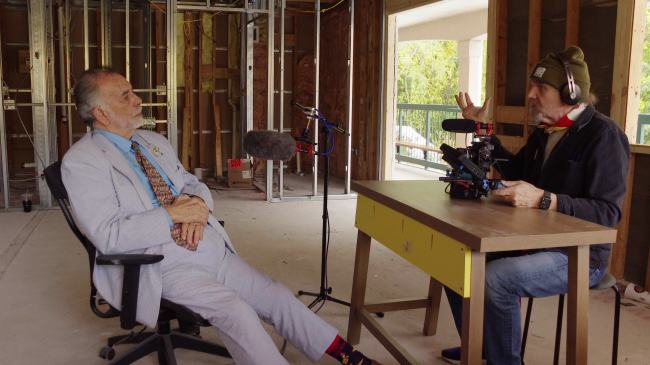 ‘Megadoc’Utopia
‘Megadoc’Utopia
Early in the documentary, the art department points out how the film’s look was still being developed during production, so she says it’s “equal parts exciting and distressing.” Could you feel that contradiction on set?
He was changing his mind every day, and then he was trying things, so his idea of fun is that if I have an idea on Friday morning, as I’m driving to work, I’m paying for this, I’ll do it. So he might turn up and say, “I’ve changed my mind, I don’t want to do it like that. Let’s try it old school.” He was having so much fun: Look at it this way. That generation of actors, and I would include myself, the fun is in the process of making the film, full stop. I remember years ago working with Albert Finney, who’s a great actor but also had directed and was very much involved in the process of filmmaking. At the end of the film, he said, “I just want to tell you I will never see this film. I had a ball making it, and I hope we do another one together, but that’s all I’m interested in.”
The fun part is in the process, so let’s try something, as opposed to the contemporary, what has become the lockdown way of making movies: Everything is locked down before you even shoot the first day, and particularly if you go for Marvel universe type stuff, it has to be locked down, hence the panic in the art department because they thought that’s what Francis wanted. And then he changed his mind because it was boring for him. It wasn’t fun. He’s not a green screen, blue screen kind of guy. And he comes from theater, so he’s from that generation. He wants to fuck around with stuff and try props and theatrical reality as opposed to Marvel reality.
That was unfortunate for the art department because they were definitely not prepared for that. Had they known he wanted to do it that way, they would have pre-planned differently. He wanted some of that stuff, but the balance was off for them, and they were ducking and diving trying to catch up.
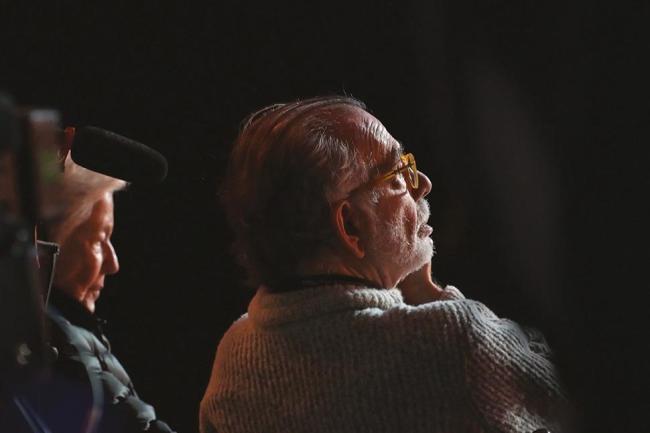 ‘Megadoc’Utopia
‘Megadoc’Utopia
This Hollywood Reporter story broke during production detailing crew exits and creative differences. Then you had Adam Driver rushing to the movie’s defense, and in “Megadoc” you see Coppola reacting to that news break. Was that exciting to you, as a filmmaker who is trained to chase drama?
The Hollywood Reporter thing was a story, and for a story to be a story, it has to be dramatic. There wasn’t, as they say, this kind of total group feeling of “it’s a disaster.” It was basically a clash between him and the art department, which he then solved by getting rid of them. As I say in the documentary, his mood immediately elevated. He was so cheerful because, in a way, he was back in control of what he understands as the filmmaking process, and the contrast was he was incredibly happy. The art department was kind of really sad because they felt they hadn’t been able to give him what he wanted. There are no villains in this piece. It’s just creative tensions which will always emerge when you work with someone like Francis. Historically, it’s been the same with Kubrick and all kinds of people. Different forms of that, but that kind of filmmaking on that kind of scale inevitably will throw up something.
There are candid moments with Shia LaBeouf, who talks about his persona non grata status, but also he had a prior, bruised relationship with Jon Voight that the movie helped him repair. Shia is volatile in person, and this movie doesn’t shy away from that. Were you prepared for that?
It was all new to me. I didn’t know much about him but, in the first days of turning up in the rehearsal, he was one of the first people I started talking to who was very open. People were cautious of me when I turned up, which I understand. They’re in a nervy situation where they’ve read the script, they don’t quite understand it. They aren’t quite sure what’s going to happen.
He had no idea who I was, and he said, “Who are you? What are you doing here? How do you know Francis?” It was a very funny conversation. I said, “I know him through Nic.” “Nic who?” I said, “Well, Coppola.” “How do you know Nic?” I said through the movie. “What movie?” I said, “Leaving Las Vegas.” “What was your connection with that?” I said, “Oh, I directed it, wrote it, did the score, and produced it,” and he went, “Holy fuck, well then what are you doing here with your little video camera?’”
From then on, we had a really good relationship. He was very open talking about the process, his process, and how that can work and as you observed yourself, his volatility within this framework, obviously, he was polite and nervous whether he was going to get fired, but quite ballsy when it came to politely questioning, “What do you want?” There’s that lovely moment in the thing where Francis loses it completely and says, “Just give me what I want,” and he goes, “I don’t know what you want.”
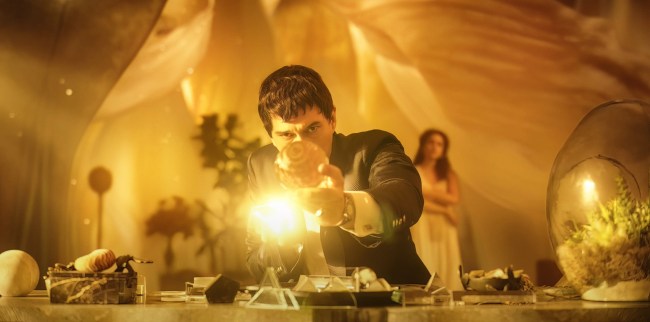 ‘Megalopolis’ ©Lions Gate/Courtesy Everett Collection
‘Megalopolis’ ©Lions Gate/Courtesy Everett Collection
Nathalie Emmanuel didn’t want to be filmed eating, and Adam Driver is known for being camera-shy and prickly toward press, but it seemed like you were able to work around these celebrity behaviors.
I had to keep reminding myself, “It’s not my movie.” It’s very easy when you’re on a set like that, you have freedom to go anywhere you want, you’ve got your camera to fall into the trap of thinking somehow this is your film. At a certain point, you are cautioned by Adam or Nathalie or whoever, the people who want to be left a little bit alone, or in Adam’s case completely alone, so I thought, OK that’s an interesting problem to work around. As I say at the beginning of the film, I’ve never watched another filmmaker at work before, so that was a revelation. After years of making a film myself, you fall into the trap of going, “Oh, that’s how we make films.” That’s bullshit. How I make films has got nothing to do with how anybody else makes a film. Quentin Tarantino makes a film or Scorsese makes a film, they’ve all got their own style.
Aubrey Plaza seemed very open with you and also someone who is turned on by the camera, even as it’s meant to be on-the-fly and nonfiction. It seemed like you developed a good relationship.
We were in rehearsal, and I was filming it. It was a couple days in, and they got used to me being there. I also am polite initially. I try and find who’s going to respond and who’s not going to respond, and Aubrey clearly as a personality has got that kind of interactive potential. What happened was, when they were rehearsing, she plays a TV reporter, and they were doing a scene, and she went, “You’re my camera man,” and she grabbed me and took me into the rehearsal as her cameraperson and started bossing me around, and said, “Here, come here, film this,” and it was Shia doing all his push-ups. At that point, Francis goes, “Mike, there’s a better angle over there.” I said, I’m on a wide lens, and he went, oh, and I suddenly thought, I’ve been commandeered into the process now, which was funny but really useful in the sense that it established this kind of thing — your question before, are they performing? Yes. of course they’re performing. I had a deal with the actors and said to all of them, once we start shooting, I will be everywhere. If I’m in your face, do this [makes throat-cutting gesture], and I’ll go away. If you want to play that I’m in your face, do this [holds palm out]. Aubrey was very good at playing the part of “you’re in my face, go away.”
There were reports about and a video showing Coppola exhibiting what people ascribed to old-school directorial behavior. Did you observe any of that?
No. Put it this way: I was there and my job was literally just to watch everything like a hawk, so that’s my job. I’m looking for, not bad things, but things that would work well in the documentary. So I’m watching and I’m trying to find stuff, and I didn’t see any of that. Either I’m not a very good filmmaker or I’m quite good. I was watching everything. I used to wake up in the morning and go, “Why am I so cheerful?” It was like, “It’s not my film. It’s not my problem. I don’t have to fix anything. All I have to do is be awake, alert, and have enough batteries so that if something happens, I get it.” There was so much interesting stuff happening that was for me really interesting.
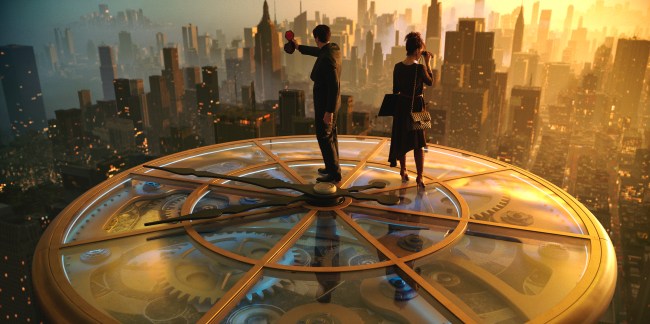 ‘Megalopolis’Courtesy of Lionsgate
‘Megalopolis’Courtesy of Lionsgate
Lastly, what do you think about “Megalopolis”?
I’d seen all the scenes being shot, so as they were shooting, I was thinking, that’s interesting, how are they going to cut that? How’s that going to fit into the sequence? The first time I saw it was in Cannes, it was the only time I’ve seen it. A couple of factors I have to add: I was very nervous because I was shooting, and I was just thinking of my batteries. Do I have enough light to shoot?
There are some scenes where I thought, that’s interesting what he’s done with that. I was still a little bit confused about the sequential, the timeline of it, and one of my feelings was there’s so much material, he’s shot so much stuff, and the story is so complicated that to get it into feature length, whatever it was at Cannes, underlines for me one of the problems that we have with film right now, since serial became such a big deal as a respected way of telling stories over five hours, six hours, that maybe this would work better in more of a serial kind of context.
I really liked when they did that with “The Godfather,” where there’s much more time with character. I felt that just getting the story into that box was slightly at the disservice of the characters. I wanted to know more about the characters, actually, personally, and about the love story and so on.
We talk about how serialized TV is impacting filmmakers and their theatrical projects, where the impulse to stuff in more material is heightened. Most movies at the Venice Film Festival this year are 150 minutes.
Since “Sopranos,” “The Wire,” etc. etc., that was such a gamechanger, and the attempt now by filmmakers to make the films longer and longer, I think there was kind of a rule about feature films, which is to do with your bum and the point when you start wriggling in your chair, it’s just too long. One of my favorite films is “Notorious,” and it’s something like 93 minutes, and it’s a perfect film, but it’s been written for that format. We’re still trying to write feature films because we love the idea of the cinema, and the feature, and sometimes there’s just too much stuff.
“Megadoc” opens in theaters on Friday, September 19 from Utopia.

